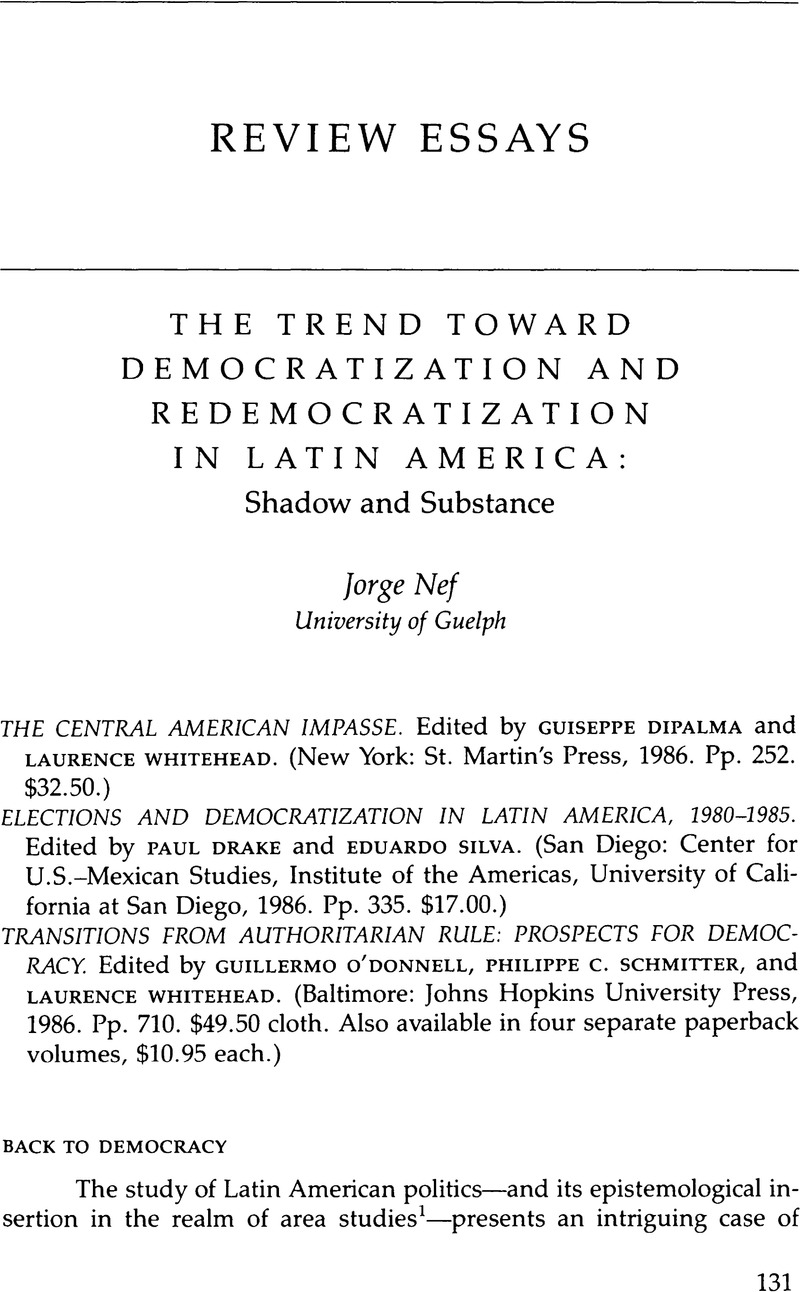Published online by Cambridge University Press: 12 October 2022

1. For a discussion of Cold War politics and area studies, see my article “Latin American and Caribbean Studies in Canada: A Developmental Perspective,” Canadian Journal of Development Studies 3, no. 1 (1982):178–79. It is important to stress the connection between the National Defense Education Act (NDEA) of October 1958 and the development of area studies—including Latin American studies—in the United States. Compare Lucien Pye, “The Confrontation between Discipline and Area Studies,” in Political Science and Area Studies, Rivals or Partners?, edited by Lucien Pye (Bloomington: Indiana University Press, 1975), 5, 12–13.
2. Compare Arturo Ascobar, “Discourse and Power in Development: Michel Foucault and the Relevance of His Work to the Third World,” Alternatives 10 (Winter 1984–85):370–400.
3. Compare Yale Ferguson, “The United States and the Political Development of Latin America: A Retropsect and a Comment,” in Contemporary Inter-American Relations: A Reader in Theory and Issues, edited by Yale Ferguson (Englewood Cliffs, N.J.: Prentice-Hall, 1972), 354.
4. See Donal Cruise O'Brien, “Modernization Order and the Erosion of a Democratic Ideal: American Political Science, 1960–1970,” Journal of Development Studies 4 (1972):331–78.
5. Compare Nelson Rockefeller, The Rockefeller Report of a United States Presidential Mission for the Western Hemisphere (Chicago: Quadrangle Books, 1969).
6. Compare Commission on United States-Latin American Relations (Sol Linowitz, Chairman), The Americas in a Changing World (New York: Quadrangle Books, 1973).
7. See Tom J. Farer in Trialogue 19 (Fall 1978):14.
8. In the NACLA Report for March-April 1979, the term crisis of domination is used in the Gramscian notion of deflation of force, p. 6. See also Robert Cox, “Gramsci, Hegemony, and International Relations: An Essay on Method,” Millennium: Journal of International Studies 12, no. 2 (1983): 162–75.
9. See Willy Brandt, North-South, A Program for Survival: The Report of the Independent Commission on International Development under the Chairmanship of Willy Brandt (Cambridge: Massachusetts Institute of Technology Press, 1980). Also see William Graf, “Anti-Brandt: A Critique of Northwestern Prescriptions for World Order,” in Socialist Register, edited by R. Miliband and J. Saville (London: Merlin Press, 1981), 20–46.
10. See Inter-American Dialogue, Rebuilding Cooperation in the Americas (Washington: Aspen Institute of Humanistic Studies, 1986), 16–34.
11. See Arturo Valenzuela, The Breakdown of Democratic Regimes: Chile (Baltimore: Johns Hopkins University Press, 1978).
12. A similar case appears to have been the transition to democracy in Venezuela after the fall of Pérez Jiménez, which is discussed by Karl in Transitions from Authoritarian Rule. For a discussion of the liberal-democratic hybrid, see C. B. McPherson, The Life and Times of Liberal Democracy (New York: Oxford University Press, 1977). Also see my article “Stalemate and Repression in the Southern Cone: An Interpretive Synopsis,” New Scholar 8 (1983):371–85.
13. Weeks's use of the term hegemony, unlike that of Gramsci's, means overwhelming, illegitimate control that often relies on force (which corresponds to Gramsci's concept of domination).
14. For a general analysis of trends and factions within the Latin American Catholic Church, see Ivan Vallier's classic study, Catholicism, Social Control, and Modernization in Latin America (Englewood Cliffs, N.J.: Prentice-Hall, 1970).
15. Compare Gustavo Gutiérrez, A Theology of Liberation: History, Politics, and Salvation (Maryknoll, N.Y.: Orbis Books, 1973).
16. Compare Nicos Poulantzas, The Crisis of the Dictatorships: Portugal, Greece, Spain (London: New Left Books, 1976). Poulantzas's neo-Marxist analysis concentrates on class formations and contradictions within the bourgeois capitalist state leading to “restructuring.”
17. See, for instance, Gabriel Almond, “The Development of Political Development,” in Understanding Political Development, edited by Myron Weiner and Samuel Huntington (Boston: Little, Brown, 1987), 437–90.
18. Middlebrook's article on Mexico is the same one already reviewed in my discussion of the Drake and Silva collection.
19. See my essay “Political Democracy in Latin America: An Exploration into the Nature of Two Political Projects,” in Latin American Prospects for the 1980s: Equity, Democratization, and Development, edited by Archibald Ritter and David Pollock (New York: Praeger, 1983), 161–81.
20. Compare with my article “Stalemate and Repression in the Southern Cone,” New Scholar 8:371–85.
21. For instance, see Generals in Retreat: The Crisis of Military Rule in Latin America, edited by Philip O'Brien and Paul Cammack (Manchester: Manchester University Press, 1985).
22. See Rodrigo Jauberth Rojas, Plan de paz de Oscar Arias: ¿intervencionismo o nuevo tipo de negociación regional? (Mexico City: PECA, CIDE, CICAH, 1987).
23. See, for instance, Douglas Chalmers, “Developing in the Periphery: External Factors in Latin American Politics,” in Ferguson, Contemporary Inter-American Relations, 11–34; or Jorge Nef and Francisco Rojas, “Dependencia compleja y transnacionalización del estado en América Latina,” Relaciones Internacionales, nos. 8–9 (Dec. 1984):101-22; and Jorge Nef, “Crise politique et transnationalisation de l'état en Amerique Latine: Une interpretation théorique,” Etudes Internationales 17, no. 2 (June 1986):279–306.
24. Compare Charles Gillespie, “From Authoritarianism Crisis to Democratic Transitions,” LARR 22, no. 3 (1987): 167–68.
25. O'Brien and Cammack, Generals in Retreat.
26. See, for instance, Almond, “The Development of Political Development,” 437–90; also Jorge I. Domínguez, “Political Change: Central America, South America, and the Caribbean,” in Weiner and Huntington, Understanding Political Development, 65–99. Cammack has referred to this epistemology as the “historical-structural” method. See O'Brien and Cammack, Generals in Retreat, 5. Compare my comments on trilateralism, military withdrawal, and restricted democracy in “Political Democracy in Latin America,” in Ritter and Pollock, Latin American Prospects, 163–73.
27. Compare Susanne Bodenheimer, “The Ideology of Developmentalism: American Political Science Paradigm, Surrogate for Latin American Studies,” Berkeley Journal of Sociology 15 (1970):95–137.
28. I presented this argument in “Redemocratization in Latin America or the Modernization of the Status Quo?,” N.S. Canadian Journal of Latin American and Caribbean Studies 11, no. 21 (1986):43-55; and also in “Violence and Ideology in Latin American Politics: An Overview,” in Violence et conflits en Amerique Latine, edited by Marcel Daneau (Quebec: Le Centre Quebeçois de Relations Internationales, 1985), 5–34.